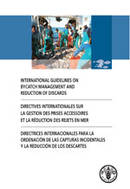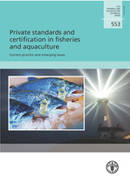出版物
These International Guidelines on Bycatch Management and Reduction of Discards were developed through a participatory process involving fisheries experts, fishery managers from governments, the fishing industry, academia and non-governmental and intergovernmental organizations.
The guidelines are designed to provide guidance on management factors ranging from an appropriate regulatory framework to the components of a good data collection programme, and include the identification of key management considerations and measures necessary to ensure the conservation of target and non-target...
Global production from aquaculture is growing substantially and provides increasingly significant volumes of fish and other aquatic food for human consumption, a trend that is projected to continue. Although aquaculture growth has potential to meet the growing need for aquatic foods and to contribute to food security, poverty reduction and, more broadly, to achieving sustainable development and the Millennium Development Goals, it is increasingly recognized that improved management of the sector is necessary to achieve...
Fisheries, including aquaculture, provide a vital source of food, employment, recreation, trade and economic well-being for people throughout the world, both for present and future generations and should therefore be conducted in a responsible manner.
To promote long-term sustainable fisheries, in 1995 the FAO Conference adopted the FAO Code of Conduct for Responsible Fisheries.Afterwards, in 2011, FAO published the Code of Conduct for Responsible Fisheries - Special Edition. This special edition of the Code of Conduct for Responsible Fisheries...
FAO Fisheries and Aquaculture Technical Paper No. 553 - Private standards and related certification schemes are becoming significant features of international fish trade and marketing.
Private standards and related certification schemes are becoming significant features of international fish trade and marketing. They have emerged in areas where there is a perception that public regulatory frameworks are not achieving the desired outcomes, such as sustainability and responsible fisheries management. Their use is also becoming more common in...
he first half of the paper introduces the conditions under which the studies were made and the data sources. It first provides caveats and assumptions which are designed to prevent misunderstanding or misinterpretation when using the data. It then reviews the world tuna stock status based on the results of Regional Fisheries Management Organizations (RFMOs) scientific reviews. Even though the biomass of most of the world’s tuna stocks is generally above but close to the...






